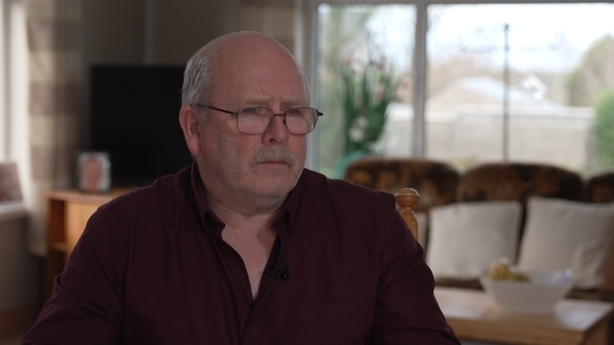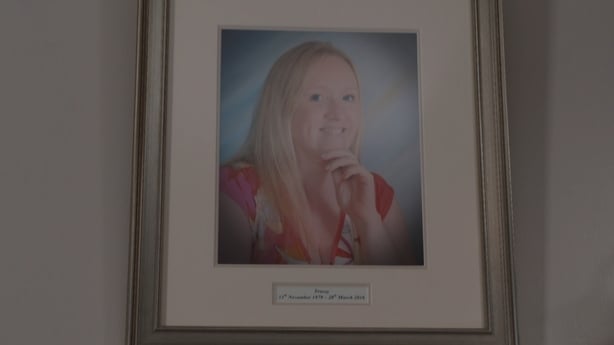The family of a young Mayo woman who died shortly after giving birth has voiced disappointment at having to learn via an online disciplinary hearing that a hospital consultant was found guilty of professional misconduct in her case.
Tracey Campbell Fitzpatrick died in St Luke's Hospital in Kilkenny after suffering a massive haemorrhage following the birth of her second child in March 2016.
Earlier this week, a remote hearing of the Medical Council’s Fitness to Practise Committee found consultant obstetrician and gynaecologist, Dr David McMurray, guilty of professional misconduct for failing to attend to Ms Campbell Fitzpatrick in a timely manner.
The inquiry heard it took Dr McMurray more than 40 minutes to arrive on site after being alerted by midwifery staff, despite living just minutes away from St Luke’s Hospital.
By that time, Ms Campbell Fitzpatrick had collapsed, suffered cardiac arrest, and later died.
However, Tracey’s husband, Bernard Fitzpatrick and the Campbell family say they were left with no choice but to watch the proceedings online when the committee decided it was appropriate to hold the hearing remotely.

"We’re very disappointed," Tracey’s father James Campbell told RTÉ Investigates.
"We were denied the opportunity to attend in person in a courtroom setting. We were denied the opportunity of seeing [David] McMurray across the room from us. We were denied the chance to speak a few words about Tracey following the hearing and outcome."
This week, at the opening of the fitness to practise Inquiry, lawyers for Dr McMurray said he was admitting and accepting that he failed to attend Ms Campbell Fitzpatrick in a timely manner when complications arose.
He was found guilty of one case of professional misconduct and one case of poor professional performance. He will be sanctioned by the Medical Council at a later stage.
However, while Ms Campbell Fitzpatrick’s family have welcomed the findings, they say after years of struggling to get to this stage, they have been left disillusioned by the process.

"We were relieved that finally [David] McMurray did admit to the charges against him and did admit that he was economical with the truth, but I had imagined we’d be walking into that courtroom situation, that the media would be there and that we would probably be filmed," Mr Campbell added.
"I thought that we would maybe be interviewed, given our chance to get our side of the story across and that in this case, [David] McMurray would also be filmed going in there and that people would understand this is what this is about. But we were denied all that.
"It was just the worst scenario you could imagine – the sooner this is scrapped, and these hearings are held properly in a courtroom setting the better."
In a statement the Medical Council said Section 31 of the Civil Law and Criminal Law (Miscellaneous Provisions) Act 2020 provides that the default position for hearings by "designated bodies" is that such hearings be held remotely, and the Medical Council is thereby statutorily entitled to hold remote hearings.
It added where the Inquiry team believes a remote hearing would be unfair or contrary to the interest of justice, it can decide to have a hearing in-person.
However, statistics released to RTÉ Investigates show that between the beginning of the Covid-19 pandemic in March 2020 and this month, of 81 fitness to practise hearings, the Medical Council has only held ten in person – equivalent to just 12%.
Furthermore, eight of those ten hearings took place before the emergency measures enabling remote hearings came into force, meaning, in effect, in the last three years, only two fitness to practise inquiries have been in person.
The family of a woman who died after giving birth has voiced disappointment at learning via an online disciplinary hearing that a consultant was found guilty of professional misconduct in her case, @aoifehegs reports | #rteinvestigates | Read more: https://t.co/BH2lMQkpVg pic.twitter.com/9v17cn3nLf
— RTÉ Prime Time (@RTE_PrimeTime) February 23, 2023
The Medical Council said there are numerous benefits to holding remote inquiries, such as allowing increased access to attend and improved accessibility for witnesses to attend inquiries, especially for those who no longer reside in the jurisdiction, but it added the council will continue to review the experience of remote inquiries.
Separately, the Nursing and Midwifery Board (NMBI) confirmed to RTÉ it operates its fitness to practise inquiries in a number of ways with most taking place in a hybrid format, some in person and some fully remotely.
It added the holding of fully remote inquiries is not its default position. Yet figures also released to RTÉ Investigates show that last year for example, when Covid restrictions had largely eased, the NMBI had 38 fitness to practise inquiries, but only two were held fully in person.
The approach has also drawn criticism from experts in the area. Speaking to RTÉ, Dr Ciarán Craven SC, who specialises in medical law said remote hearings do not serve the public interest.
"It’s very difficult to conduct a hearing online. It’s difficult for the participants and for those who are seeking to observe it.
"It’s really hard when everybody is reduced to what’s really no more than a small postage stamp at the bottom of a screen where you can’t see the individual’s face and it’s probably obscured by their name in any event," Dr Craven said.
"The flow of the hearing is interrupted, you’re reliant on technology that doesn’t work all the time.
"In the context of an emergency, it was the best that could be done but there’s probably no real good or practical reason as to why the default position, which is oral hearings, simply can’t be returned to – there is no substitute for being in the room."






